If you’ve got a dachshund, you probably already know about IVDD. But honestly, that’s just one piece of the puzzle—these little dogs can run into a bunch of other health problems too 🐾.
Knowing about these issues helps you spot warning signs early 🧐 and gives your pup a better shot at a happy life. Many dachshunds deal with weak joints, vision trouble 👁️, or skin problems at some point.
Caring for a dachshund means more than just treating back problems. You’ve got to keep an eye on changes in their weight ⚖️, appetite 🍽️, and behavior too.
Key Takeaways 📝
- Dachshunds can face a variety of health problems beyond IVDD. 🐶
- Watching for changes in your dog helps catch problems early. 👀
- Regular vet visits and good care keep your dachshund healthier. 🩺
🐾 Free Dachshund Care Guide
Download our free checklist to ensure your Dachshund stays happy, healthy, and well-loved!
Get Your Free Guide 🐶Overview of Common Dachshund Health Issues
Dachshunds run into several health problems, mostly thanks to their genetics and that unique body shape 🐕. If you know what to watch for, you can step in early and keep your Doxie feeling pretty good 😊.
Genetic Predispositions 🧬
Dachshunds tend to inherit certain conditions. Progressive Retinal Atrophy (PRA) causes slow vision loss and can lead to blindness 👁️.
This disease gets passed down and sometimes hides out until vision problems finally show up. Patellar luxation is another issue—they get kneecaps that slip out of place, which leads to limping or pain 🦴.
Short, long-backed dogs like Doxies can also get Congenital Heart Disease ❤️, including mitral valve disease. Your vet can often catch these things during regular checkups 🩺.
A summary table:
| Genetic Condition | Main Concern | Detection |
|---|---|---|
| Progressive Retinal Atrophy | Blindness risk | Eye exams 👁️ |
| Patellar Luxation | Pain, limping | Orthopedic exam 🦴 |
| Heart Disease | Heart failure risk | Heart checkups ❤️ |

🌱 Wild Earth Dog Food – Clean, Plant-Based Nutrition
This vet-developed dog food skips the meat and delivers clean, cruelty-free protein that supports healthy digestion and energy.
- ✅ Hypoallergenic formula with no animal by-products
- ✅ Perfect for Dachshunds with food sensitivities
- ✅ Supports healthy gut, coat, and weight balance
Breed-Specific Health Risks ⚠️
With that long spine and those stubby legs, Doxies have some unique risks. Obesity sneaks up on them fast, and too much weight just makes their joints and back work harder ⚖️.
It’s smart to keep an eye on what they eat and how much they move 🍽️. Dental disease is another pain—small mouths and crowded teeth mean tartar builds up quickly 🪥.
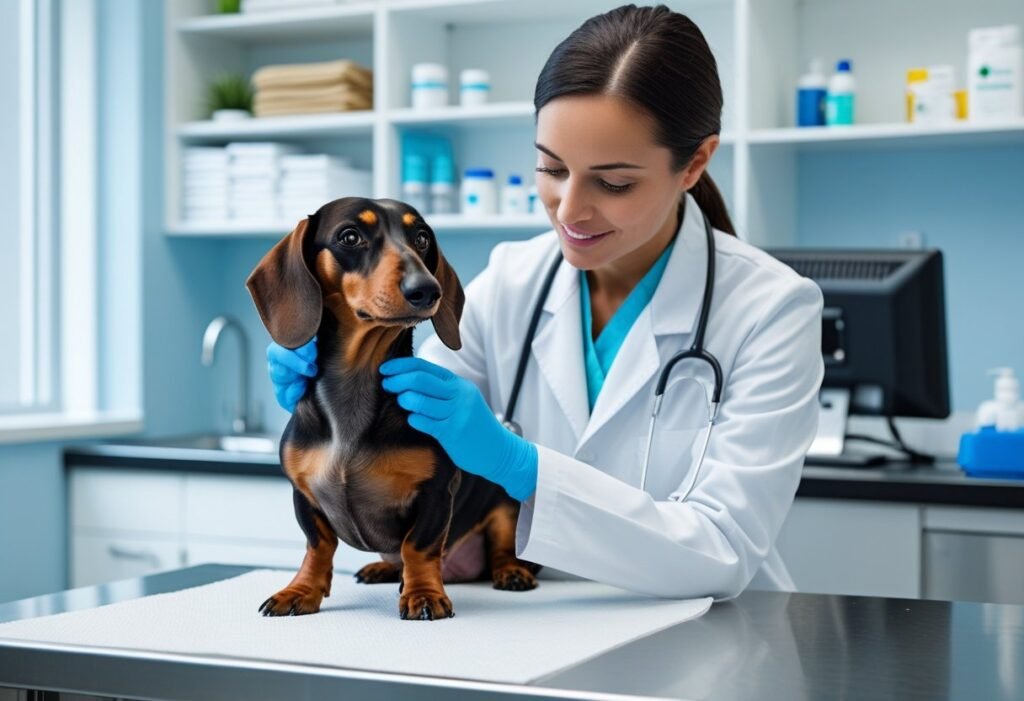
Brushing your dog’s teeth and getting regular dental cleanings keeps that in check. Dachshunds can also develop hypothyroidism, which leads to tiredness, weight gain, and skin problems 😴.
Routine blood tests help you spot this before it gets out of hand 🧪.
General Doxie Health Problems 🐾
Like any breed, Dachshunds pick up some general health issues. Their floppy ears trap moisture and dirt, so ear infections are pretty common 👂.
Cleaning and drying their ears can make a big difference 🧼. Skin problems—allergies, dry patches, or flaky skin—pop up too.
You’ll see scratching, licking, or even patches of hair loss 🐶. Sometimes it’s food, sometimes pollen, sometimes fleas—your vet can help you figure it out.
Bladder stones happen, and you’ll notice accidents or straining to pee 🚽. If you see blood in the urine or your dog’s struggling, call the vet fast 📞.
Keeping your Doxie hydrated 💧 and feeding the right diet helps prevent these problems.
Orthopedic Issues in Dachshunds
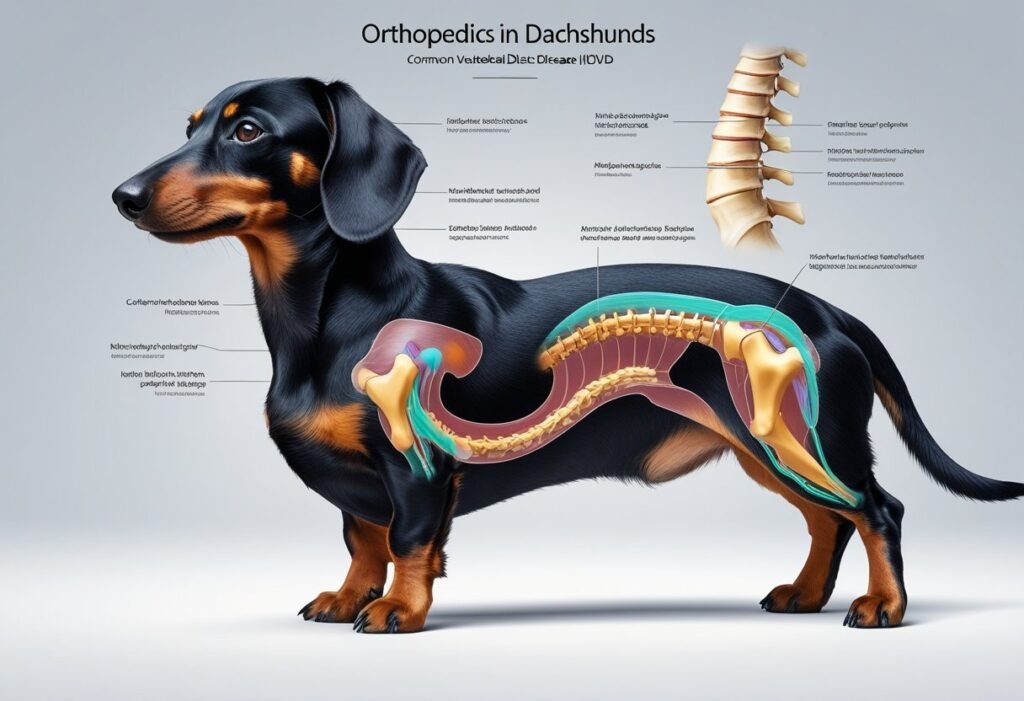
Dachshunds really seem to draw the short straw with orthopedic problems 🦴. Kneecap dislocation and hip joint issues are two of the big ones 😬.
Patellar Luxation 🐾
Patellar luxation means the kneecap pops out of place. In Dachshunds, this is called Dachshund patellar luxation 🦿.
Your dog might limp or skip steps, especially after running around 🐕. Their odd body shape and short legs don’t help with this.
Look for sudden limping, holding up a back leg, or a popping sound when they move 👂. Sometimes it’s mild and barely noticeable, but it can get pretty painful and make walking tough 😟.
Mild cases often get better with rest and keeping your dog at a healthy weight ⚖️. If it’s severe, surgery might be the only fix 🛠️.
Regular vet visits and watching how your dog walks will help you catch this early 👀.
Symptoms to watch for:
- Sudden limping
- Difficulty bearing weight on a back leg
- “Skipping” steps
- Popping or clicking sounds in the knee

🧾 The Swiftest Pet Insurance – Compare Top Plans for Dachshund Health
Prevention starts with preparation. The Swiftest helps you compare trusted pet insurance providers so you can handle any unexpected health issue before it becomes serious.
- ✅ Compare multiple pet insurance plans in one place
- ✅ Get coverage for chronic and breed-related conditions 🩺
- ✅ Protect your Dachshund’s long-term health with confidence

Hip Dysplasia 🐶
Hip dysplasia happens when the hip socket doesn’t form right. It’s not super common in Dachshunds, but it does happen 🔍.
You might see your dog struggling to stand up or not wanting to run and climb stairs 🛑. Stiffness, a swaying walk, or pain after exercise can also show up 🏃♂️.
Hip dysplasia can turn into arthritis and really slow your dog down 💤. Your vet might suggest X-rays if they suspect a problem 🩻.
Treatment depends on how bad it is—sometimes medication, special diets, or joint supplements help 💊. If it’s really bad, surgery might be needed 🏥.
Key signs:
- Difficulty rising 🛏️
- Swaying or stiff walk 🚶
- Weakness in the back legs 🦵
- Decreased willingness to play or exercise 🎾
Eye and Vision Concerns
Dachshunds can develop eye problems that mess with their vision or even cause blindness 👁️. If you catch these early and see your vet regularly, you can sometimes slow things down ⏳.
Progressive Retinal Atrophy 🧬
Progressive Retinal Atrophy (PRA) is a genetic eye disorder in dachshunds. The retina—the part that senses light—slowly breaks down 🔬.
Dogs with PRA usually start having trouble seeing at night 🌙. Eventually, even daytime vision fades and blindness sets in.
No cure exists for PRA. Breeders should screen dogs to help stop it from passing to puppies 🐾.
Clumsiness, bumping into things, or a shiny reflection in the eyes can all be signs. If you see these, get an eye exam from your vet 🩺.
PRA isn’t painful, but it definitely changes how your dachshund gets around 🚶.
Quick facts:
| Symptom | When it appears |
|---|---|
| Night blindness | Early 🌙 |
| Day blindness | Later stages 🌤️ |
| Pupils dilated | Progresses 👁️ |

👨🍳 ChefPaw Fresh Food Maker
- ✅ Make healthy meals at home with ease
- ✅ Perfect for dogs with food sensitivities
- ✅ Say goodbye to preservatives and fillers

🍽️ Petlibro Automatic Feeder
- ✅ Keeps mealtimes consistent—even when you’re busy
- ✅ Helps avoid overfeeding or missed meals
- ✅ Great for pups with sensitive routines

Cataracts 🌫️
Cataracts make the lens in your dachshund’s eye turn cloudy or milky 🐶. That blocks light, so seeing gets tough.
Cataracts can happen as your dog ages, after an injury, or because of health issues like diabetes 🧪. You might see your dog’s eye look cloudy, gray, or blue 🧊.
They might have trouble with stairs or act cautious in new places. Cataracts sometimes cause more problems like lens dislocation or inflammation 🔍.
If it’s a mild cataract, your vet might just keep an eye on it. Surgery is the only way to restore vision, but not every dog needs it 🛑.
Non-surgical treatments can help with swelling or pain, but they won’t fix the cataract itself 💊.
Symptoms to watch:
- Cloudy or bluish eye appearance 👁️
- Bumping into objects 🪑
- Unusual cautious behavior 🚧
Glaucoma ⚠️
Glaucoma cranks up the pressure inside the eye, which can damage the optic nerve and cause vision loss 🚨. It can hit dachshunds suddenly or sneak up slowly.
This is an emergency—if you don’t treat it quickly, blindness can set in fast ⏱️. Look for redness, a cloudy eye, swelling, or pain 😢.
Your dog might keep the eye closed, paw at it, or shy away from bright light 💡. Glaucoma hurts, and it can get much worse in just a day or two.
Your vet can check eye pressure during regular exams 🩺. Treatment can involve eye drops, oral meds, or sometimes surgery to save vision 💧.
Important:
- Call your vet right away if you see sudden changes 📞
- Fast treatment can prevent permanent blindness ✅
Allergies and Skin Conditions
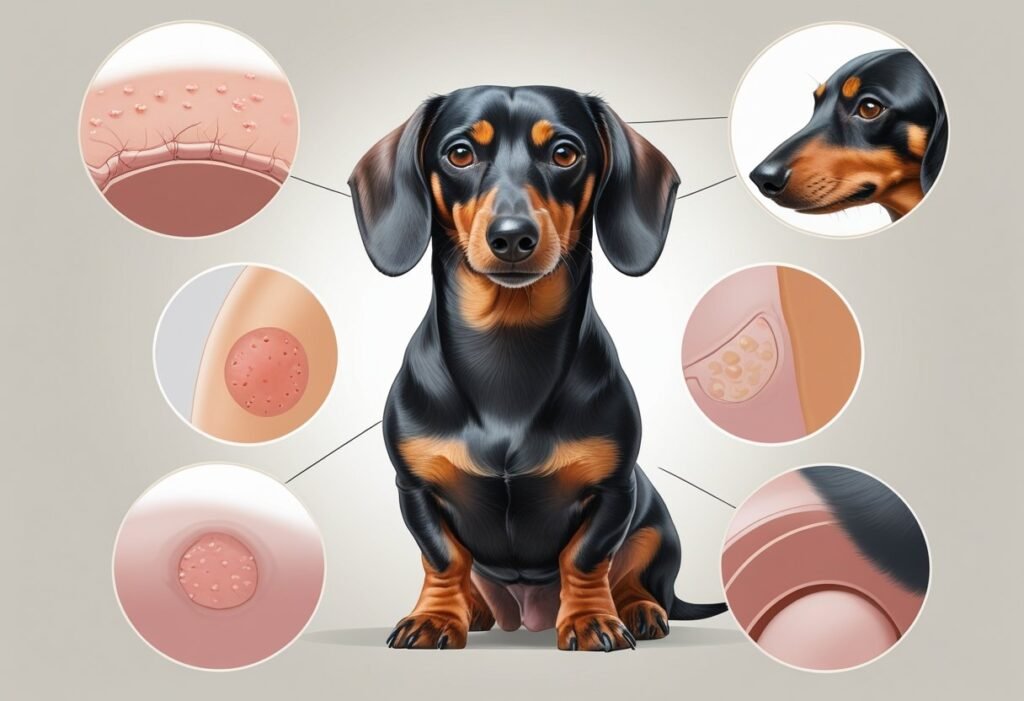
Dachshunds often deal with skin problems that cause itching, redness, and hair loss 🐕. If you ignore these, things can get worse and your dog will be miserable 😣.
Atopic Dermatitis 🌿
Atopic dermatitis is a long-term skin issue triggered by allergens like pollen, dust mites, or mold 🧫. You’ll notice your Dachshund scratching, licking, or chewing at their paws, belly, or ears more than usual 🐾.
The skin might look red or irritated 🔴. This usually shows up between ages 1 and 3 and can get worse at certain times of year if it’s from outdoor stuff, or all year if it’s something inside 🗓️.
Secondary infections from bacteria or yeast are common 🦠. Treatment usually means regular baths, meds for itching, and avoiding allergens when possible 🛁.
Your vet might suggest allergy testing or a special diet 🍽️. Keeping your dog’s living space clean can help, too 🧼.

🧫 AnimalBiome Gut Health Test Kit
- ✅ Detects gut imbalances linked to skin, digestion & mood issues 🩺
- ✅ Helps identify early signs before they become chronic problems ⚠️
- ✅ Easy home test with actionable, vet-approved results 🌿

🧘♀️ Zumalka Calmpet – Natural Anxiety Relief Drops
- ✅ Reduces stress that can worsen health symptoms 💧
- ✅ Supports emotional balance for smoother recovery 🐾
- ✅ Safe, gentle, and plant-based — ideal for sensitive Dachshunds 🌱
Flea Allergy Dermatitis 🦟
Flea allergy dermatitis hits when your Dachshund reacts to flea bites. Sometimes, just one bite sets off intense itching and red bumps, mostly along the back, tail, and belly 😖.
Your dog might scratch or chew at their skin, which can lead to hair loss and scabs. Fleas aren’t always easy to spot since dogs tend to groom them off pretty fast 🔍.
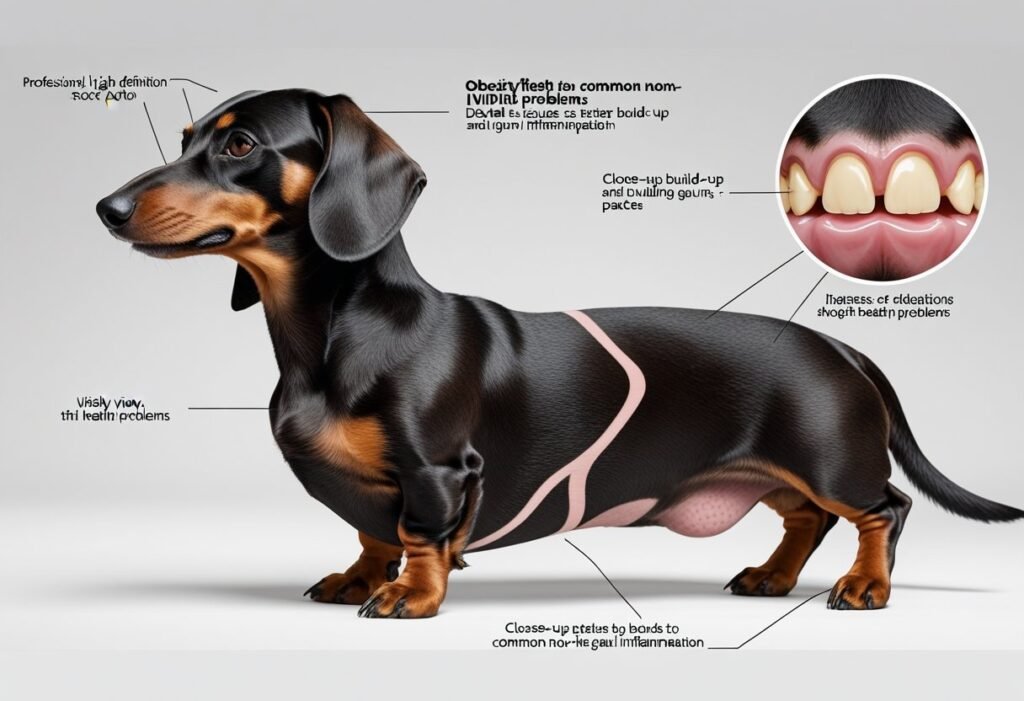
Stopping fleas is the best way to prevent flea allergy dermatitis:
- Stick with veterinarian-approved flea preventives all year.
- Wash your dog’s bedding regularly.
- Treat your other pets and your home for fleas, too.
If your dog reacts, your vet might recommend antihistamines, steroids, or antibiotics for infected skin 💊.
Acanthosis Nigricans 🖤
Acanthosis nigricans shows up more in Dachshunds than most breeds. It causes dark, thick, and sometimes waxy skin, usually in the armpits, groin, or skin folds 🩹.
This condition can be inherited or develop from things like obesity, friction, or hormone problems ⚖️. Most Dachshunds get it young, and it usually stays pretty mild.
Look for dark patches, thickened skin, and sometimes a bit of itching 🧐. Managing what’s causing it, keeping your dog’s skin clean, and using special shampoos or creams can help 🧴. If infections or discomfort pop up, your vet may suggest more treatment 🩺.
Hormonal and Metabolic Disorders
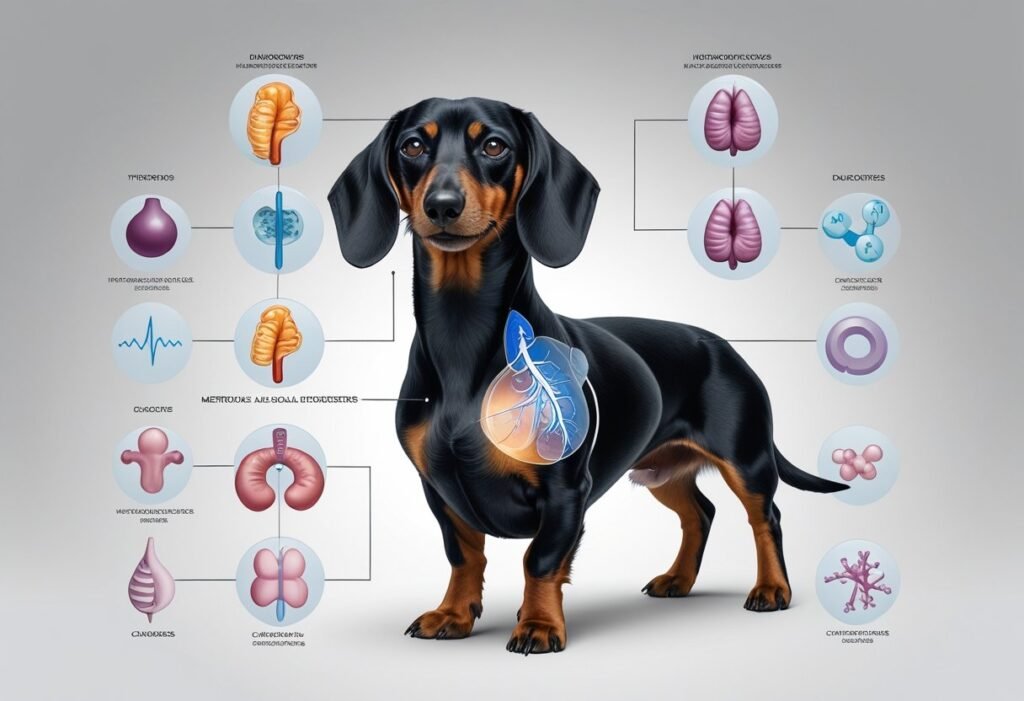
Dachshunds can run into hormone and metabolism issues that mess with their organs, weight, and energy ⚖️. You might not see signs right away, so those regular vet visits really matter 🩺.
Cushing’s Disease 🧪
Cushing’s disease (hyperadrenocorticism) happens when your dachshund’s body pumps out too much cortisol 🧠. Cortisol helps with stress and metabolism, but too much of it spells trouble ⚠️.
Key signs to watch for include:
- Increased hunger and thirst 🍽️
- More frequent urination 🚽
- Thinning hair or skin 🐾
- Pot-bellied appearance 🐕
- Lethargy 😴
Older dachshunds tend to get this more often. Your vet will probably do blood tests and maybe an ultrasound to figure it out 🧬. Treatment usually means daily meds, and sometimes surgery if it’s really bad 💊. If you ignore it, Cushing’s can cause infections and muscle loss 💥.

🛏️ Majestic Pet Orthopedic Bed
- ✅ Supports joints and spine alignment for pain-free rest 🩺
- ✅ Prevents stiffness and pressure on sensitive back areas 🌿
- ✅ Encourages deep, restorative sleep for overall wellness 😴

🪜 Majestic Pet Stairs
- ✅ Helps Dachshunds avoid risky jumps from sofas or beds ⚠️
- ✅ Reduces spinal strain and joint wear over time 🐾
- ✅ Lightweight, stable, and designed for small breeds 🏡
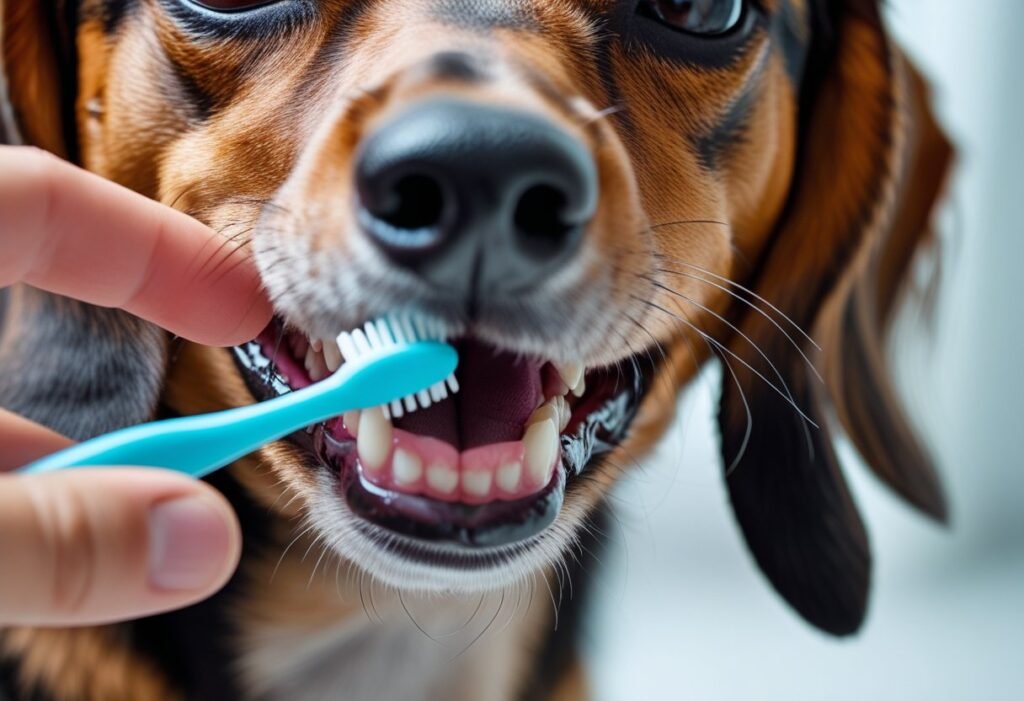
🎉 Grab your free Dachshund care checklist!
Diabetes Mellitus 🍬
Diabetes messes with your dog’s ability to use sugar. When your dachshund has diabetes, their insulin isn’t working right or isn’t there at all 🧫.
Watch for symptoms like:
- Sudden weight loss, even if eating well ⚖️
- Extreme hunger and thirst 💧
- Frequent urination 🚾
- Cloudy eyes (cataracts) 👁️
This condition takes careful management. Most dachshunds with diabetes need daily insulin shots and a special diet with lots of fiber and not much fat 🥦. You’ll need to keep an eye on their blood sugar and watch for warning signs at home. If diabetes isn’t controlled, it can lead to blindness, infections, or worse ❗
Heart and Respiratory Conditions
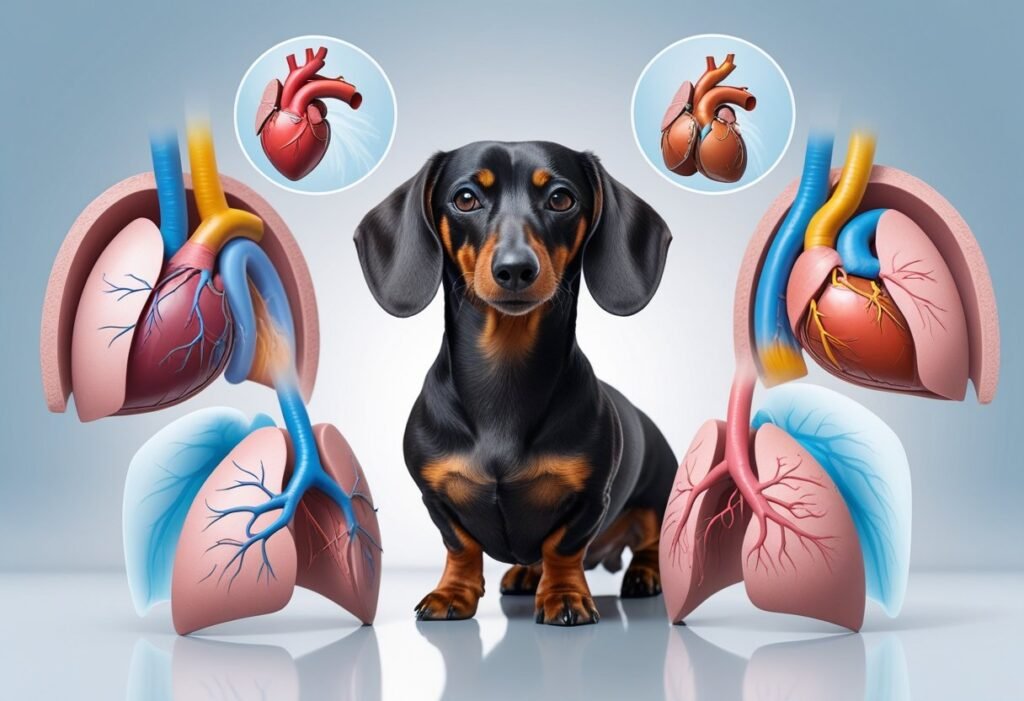
As Dachshunds get older, some start having heart or airway issues ❤️🩹. These problems can mess with their breathing, sap their energy, and just make them feel off 🌬️.
Mitral Valve Disease ❤️
Mitral Valve Disease (MVD) is a heart condition you see a lot in older Dachshunds. The mitral valve gets weak or leaky, so the heart works overtime and sometimes gets bigger 🫀.
Watch for coughing, tiredness, and breathing trouble, especially after walks or play 🐕. Some dogs eat less or even faint. Vets usually spot MVD during an exam by hearing a heart murmur 👂.
Meds can help the heart pump better and clear out extra fluid from the lungs 💊. You’ll need regular checkups and to stick to the treatment plan 📅. Keeping your dog at a good weight and giving meds as prescribed really helps ⚖️.
Signs of MVD to watch for:
- Frequent coughing 🗣️
- Breathing faster than normal 😮💨
- Low energy 💤
- Loss of appetite 🍽️

📹 Petcube Cam 360
- ✅ Monitor your Dachshund’s movement and rest patterns remotely 🏡
- ✅ Detect early changes in mobility or energy levels 🩺
- ✅ Talk and comfort your pup anytime to reduce stress and anxiety 💬
📍 Tractive DOG GPS Tracker
- ✅ Track your Dachshund’s location and daily activity in real time 📱
- ✅ Spot changes in activity that could signal pain or fatigue ⚠️
- ✅ Ensures your pup stays safe during outdoor exercise and adventures 🌳

Tracheal Collapse 🫁
Tracheal collapse messes with the windpipe, making it soft and floppy. The rings in the trachea lose their strength, so the airway can flatten out 🧩.
The classic sign? A dry, honking cough. You might hear it more when your Dachshund gets excited or pulls on a leash 🐾. Some dogs also struggle to breathe, especially when it’s hot or after exercise ☀️.
Managing weight and skipping neck collars usually helps 🦺. Your vet might prescribe meds for coughing or inflammation. If things get really bad, surgery could be on the table 🏥.
Important tips:
- Use a harness, not a collar 🎽
- Don’t let your dog get overweight ⚖️
- Keep an ear out for noisy or tough breathing 👂
- Call your vet if the coughing gets worse 📞
Dental and Oral Health Problems
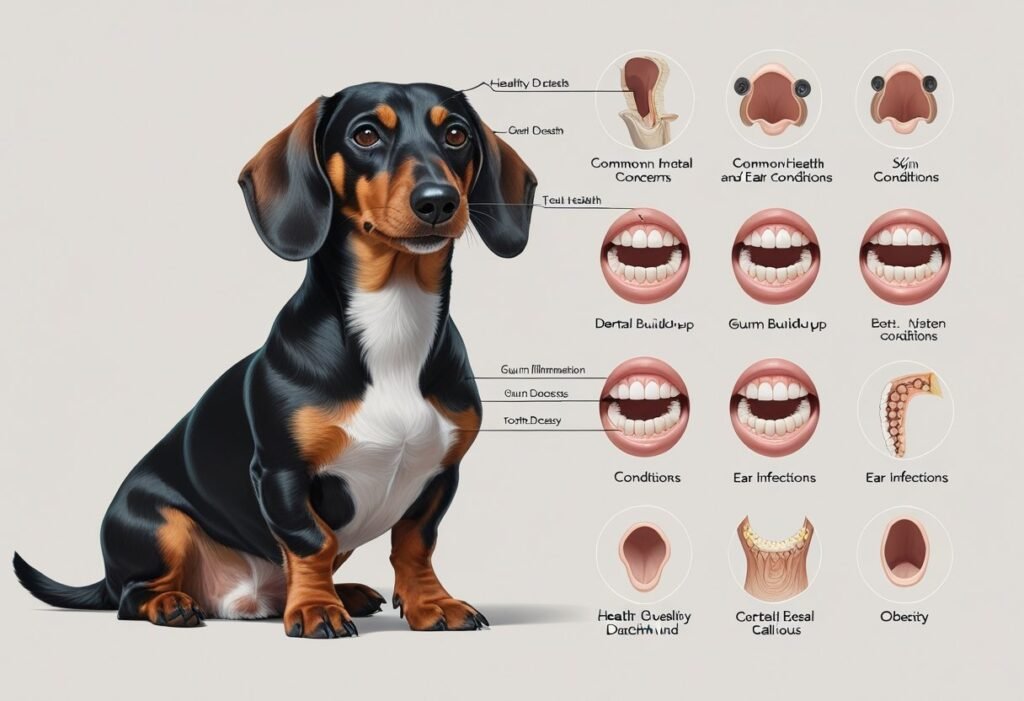
Dental problems in Dachshunds can sneak up fast, causing pain, bad breath, and infections 🦷. Taking care of their mouth early and often makes a big difference 🪥.
Periodontal Disease 🦠
Periodontal disease is super common in Dachshunds and usually starts with plaque build-up at the gum line. Red or swollen gums, bleeding when chewing or brushing, and a stinky mouth are all warning signs 😷. If you let it go, the gums pull back and tooth roots show.
Food and bacteria get stuck between teeth and gums, causing infection. Eventually, the bone holding the teeth can break down. Some Dachshunds stop eating or only chew on one side when it hurts 🍽️.
Brush your dog’s teeth, give dental treats, and schedule yearly cleanings with your vet 🗓️. If you spot symptoms, get your dog checked out soon to prevent bigger problems 🩺.
Key symptoms to watch:
- Swollen, red, or bleeding gums 🔴
- Persistent bad breath 🤢
- Loose teeth 🦷
- Hesitation to eat or play with toys 🧸

💧 Petlibro Water Fountain
- ✅ Promotes steady hydration for kidney & urinary health 🩺
- ✅ Filters impurities and keeps water fresh all day 🌿
- ✅ Encourages Dachshunds to drink more — vital for overall wellness 💧

🧫 AnimalBiome Gut Restore Capsules
- ✅ Rebalances gut bacteria to prevent digestive issues ⚖️
- ✅ Improves nutrient absorption and immune strength 💪
- ✅ Ideal for Dachshunds with allergies or sensitive stomachs 🌱
Tooth Loss 😬
Most of the time, Dachshunds lose teeth because of gum disease or injury. Missing teeth can make eating tough and might even cause other health issues, like pain with kibble or chewing 🍖.
Loose teeth often mean infection, which can cause swelling or pus. If your Dachshund loses a tooth, have a vet check for infection or other dental problems 🔍. Sometimes, they’ll want x-rays to see what’s going on under the gums 🩻.
If your dog’s missing a lot of teeth, your vet might suggest soft food or a special diet 🥣. Keeping those teeth clean and getting regular dental check-ups is really the best way to avoid tooth loss from dental disease ✅.
Obesity and Nutritional Challenges
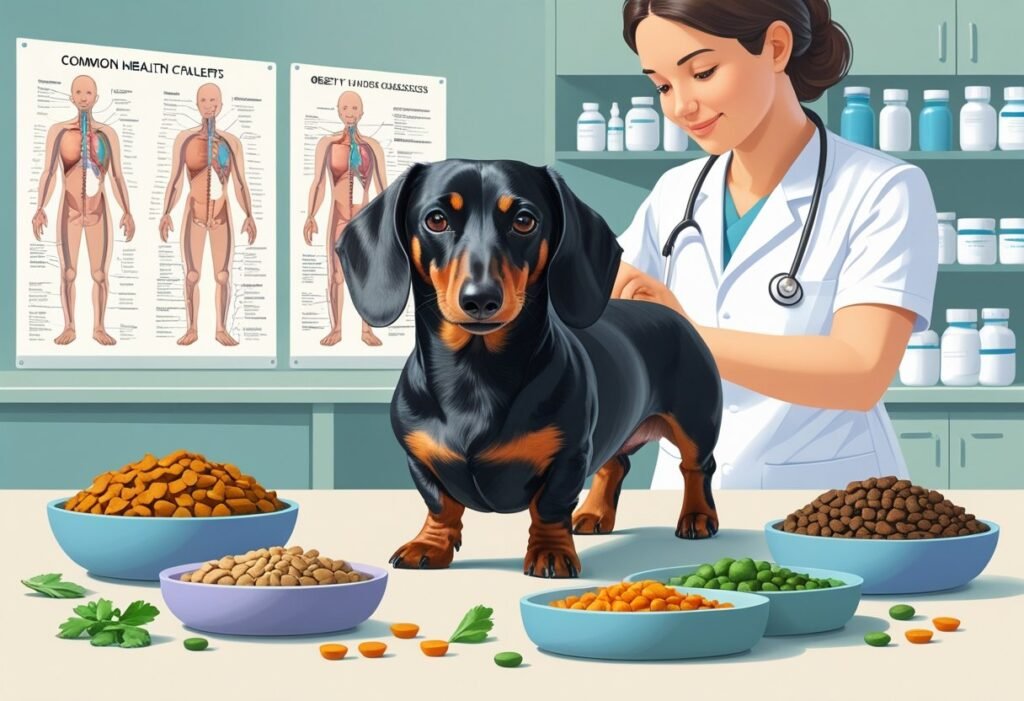
Dachshunds tend to put on weight easily, which leads to all sorts of problems like heart disease and diabetes ⚖️. Good food and balanced nutrition keep your dog healthy and moving 🍎.
Weight Management Strategies 🐾
Extra weight puts more strain on your dachshund’s spine and joints, which ups the risk for back issues and arthritis 🦴. Stick to a regular feeding schedule and use a measuring cup so you’re not overfeeding 🥄.
Take daily walks and let your dog play, even if it’s just for short bursts 🐕. If your dog gets tired quickly, break exercise into smaller chunks 🏃♂️. Skip the table scraps—even tiny bits add up 🍽️.
Try low-calorie treats or healthy options like baby carrots or apple slices (no seeds, though) 🥕🍏. Ask your vet for a target weight and check in on progress 📏.
A simple tracking chart helps:
| Week | Goal Weight | Actual Weight |
|---|---|---|
| 1 | 20 lbs | 21 lbs |
| 2 | 19.5 lbs | 20.8 lbs |
Weigh your dachshund at home or during vet visits every few weeks 🏥.

🛁 Pride + Groom Grooming Tools Kit
- ✅ Gentle tools to keep skin and coat healthy — prevents irritation that can lead to infections 🩺
- ✅ Makes grooming a calming routine that reduces stress-related health issues 🌿
- ✅ Easy-to-use for multi-pet households — promotes cooperative care and regular maintenance 🐾
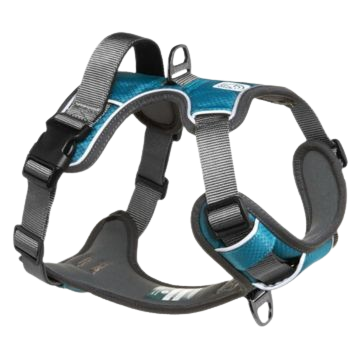
🦺 Embark Pet Adventure Harness
- ✅ Helps prevent neck strain and spinal stress during walks — key for long-term back health ⚠️
- ✅ Encourages safer, controlled exercise to reduce accidental injuries during play 🐕🦺
- ✅ Adjustable, comfortable fit that supports mobility and slow, steady rehabilitation 🌤️
Nutritional Deficiencies 🍲
Dachshunds need a balanced mix of protein, fat, carbs, and the right vitamins and minerals 🧪. If you feed home-cooked or raw food, you’ve got to plan carefully or your dog might miss something 🍖.
Most commercial foods labeled “complete and balanced” cover the basics. Missing key nutrients can cause dry skin, a dull coat, or a weak immune system 🐶.
Tiredness or hair loss might mean your dog’s diet is lacking 😴. Don’t go overboard with supplements—too much of a good thing can backfire 🚫.
Before you make big changes or add vitamins, talk to your vet 🩺. If you’re not sure, bring the dog food packaging to your appointment and ask what your dachshund might need 📦.
Cancer Risks in Dachshunds
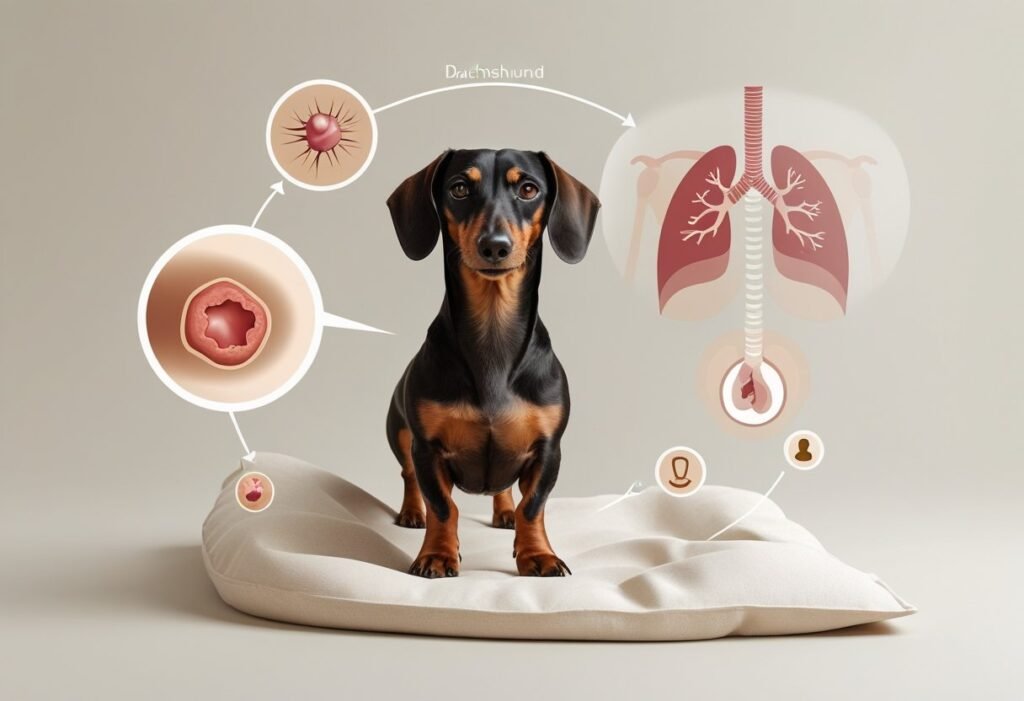
Dachshunds face a higher risk of some cancers than other breeds 🎗️. If you know what to look for, you can get your dog treated faster ⏱️.
Common Tumor Types 🧬
The most common cancers in dachshunds are mast cell tumors, soft tissue sarcomas, and mammary gland tumors 🧫. Mast cell tumors usually show up as lumps on or under the skin, and they might grow or change shape quickly 👀.
Soft tissue sarcomas form in fat, muscle, or connective tissue and feel like firm, painless lumps anywhere on the body 🧱. Female dachshunds can get mammary gland tumors, especially if they weren’t spayed young 🚺.
Other cancers, like melanoma or lymphoma, aren’t as common but still possible. If you notice any weird lumps or bumps, it’s worth checking with your vet—catching it early can really help 🩺.

🧠 Brain Training for Dogs
- ✅ Boosts mental focus and reduces anxiety-driven behavior 🐾
- ✅ Strengthens the bond between you and your Dachshund 💕
- ✅ Keeps your Doxie sharp and engaged — great for aging pups too 🎯

🎨 Purr & Mutt Personalized Dachshund Art
- ✅ Celebrate your Dachshund’s unique charm with custom artwork 🖼️
- ✅ Boosts emotional connection — perfect for multi-pet or healing homes ❤️
- ✅ Makes a heartfelt gift to honor your pet’s joyful spirit 🌟
Signs and Early Detection 🔍
Watch for these signs of cancer in your dachshund:
- New or growing lumps and bumps 🐾
- Wounds that do not heal 🩹
- Loss of appetite or unexplained weight loss 🍽️
- Weakness, tiredness, or changes in behavior 😴
- Bleeding or discharge from any part of the body 🚫
If you spot any of these signs, go ahead and book a vet appointment right away 📞. Your vet might recommend tests like a biopsy or some bloodwork to check for cancer 🧪.
Routine check-ups make it easier to catch things early 📅. Take some time to check your dog’s skin, mouth, and body for anything odd or new 🐶.
When you catch health issues early, you’ve got more treatment options ✅. It’s just a better way to keep your dog feeling good ❤️.
Liver and Digestive Disorders

Dachshunds can run into trouble with their liver and digestive system 🍽️. Sometimes the early signs slip under the radar, but quick action can really make a difference 🕵️.
Liver Shunt 🧪
A liver shunt means blood skips the liver, so it can’t clean out toxins 🧬. In Dachshunds, this issue can show up from birth 🐾.
Watch for signs like:
- Poor growth 📉
- Vomiting or diarrhea 🤢
- Trouble walking, confusion, or seizures 🧠
- Tiredness after eating 😴
You might notice a liver shunt when your puppy is just a few months old. Vets use bloodwork and ultrasound to check liver function 🩻.
Surgery is often needed, but some dogs do well with special diets and medication 💊. Feed your dog food that’s low in protein—your vet will help you figure out what’s best 🍲.
Regular checkups help you spot changes before things get worse 🩺.
🌟 Everyday Essentials to Prevent Stress, Pain & Health Issues
- 🍪 Petcube Bites 2 — Reward calm and gentle behavior remotely while observing eating habits or mobility changes that may indicate discomfort early on.
- 🧴 King Klean Dog Shampoo (King Kanine) — Gentle, non-toxic formula that soothes skin, prevents dryness, and supports a healthy coat to reduce itching or irritation-related stress.
- 🌿 Innovet PurCBD Oil — Natural relief for inflammation, anxiety, and joint pain — helps prevent discomfort that can lead to inactivity or long-term spinal strain.
- 🦺 Coastal Pet Harness — Reduces neck and back pressure during walks, preventing spinal stress — a must for Dachshunds prone to mobility-related injuries.
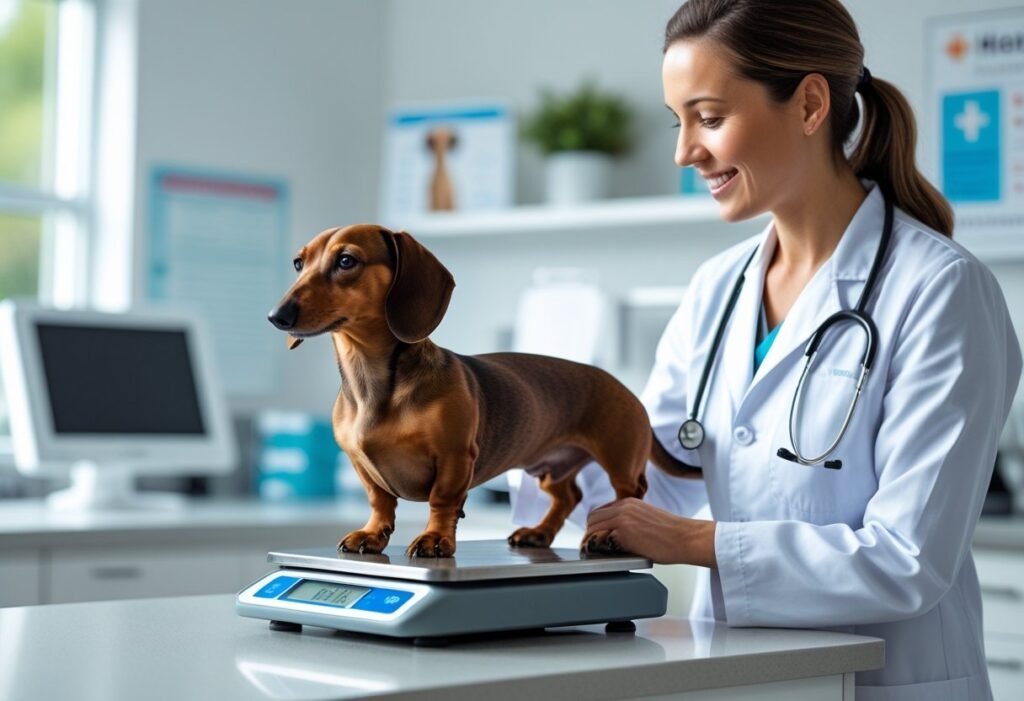
Gastrointestinal Issues 🦴
Dachshunds can have stomach and intestinal troubles. Common problems include:
- Gastroenteritis (inflammation)
- Food allergies or sensitivities
- Pancreatitis (swelling of the pancreas)
You might see vomiting, diarrhea, or even bloody stools 💩. Belly pain and loss of appetite show up too, especially after your dog eats something fatty or unfamiliar 🧀.
Your vet will try to find the cause with stool tests, bloodwork, or maybe x-rays 🔍. Treatment can mean medicine, fluids, or a switch to a special diet 💧.
It helps to keep track of what foods bother your dog—skip the table scraps and spicy treats 🚫. A steady routine and the right food go a long way to keeping GI issues at bay ✅.
Preventative Care and Regular Check-Ups
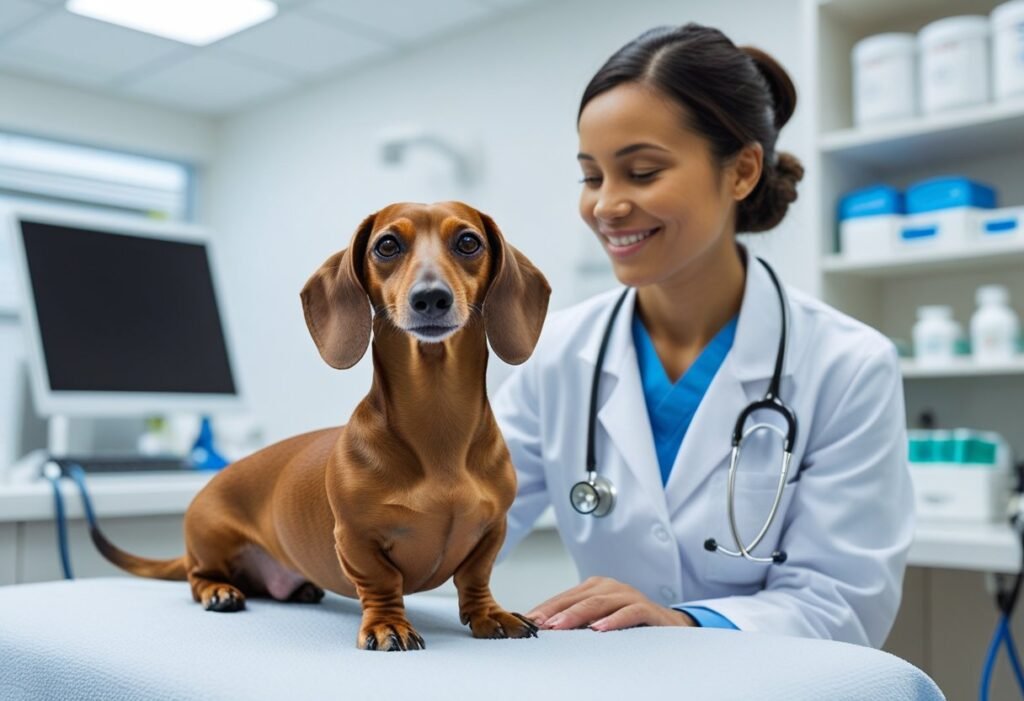
Looking after your Dachshund means staying alert for health changes 👀. Catching things early can help you avoid bigger problems down the road 🛣️.
Importance of Early Detection ⏱️
Spotting issues early can keep them from getting out of hand 🚨. Dachshunds often deal with dental disease, obesity, and heart problems, but the signs can be sneaky at first 🐶.
Take gum disease, for example—it can creep up and lead to tooth loss or infections if you miss it 🦷. If your dog has trouble eating, gains or loses weight, or just seems off, pay attention 🔍.
It’s worth a vet visit, even for small changes 🩺. Sometimes those little signs point to bigger things, like diabetes or thyroid problems 🧪.
Check your dog’s skin, eyes, and coat too 🐾. Itching, scratching, red spots, or hair loss might mean something’s up ❗
Getting help early usually makes treatment easier and keeps your dog comfortable ✅.
💛 Grooming & Dental Care Essentials to Prevent Hidden Health Issues
- 🪮 King Kanine Deshedding Tool – Gently removes loose fur and dander, preventing matting and skin irritation that can lead to infections.
- 🧴 Pride + Groom “The Final Coat” Conditioner – Deeply nourishes the coat and skin, locking in moisture and promoting a natural shine while reducing itching.
- 🪥 Innovet Dental Care Gel – Fights plaque and tartar naturally to prevent gum disease, inflammation, and bad breath — a key step for Dachshund wellness.
- 🧬 AnimalBiome Oral Health Test Kit – Identifies bacterial imbalances in your dog’s mouth before they cause dental or digestive complications.
- 🐾 PetCareSupplies Dental Powder – Easy-to-use daily supplement that freshens breath and helps maintain clean teeth and healthy gums.
🦷 Regular grooming and oral hygiene don’t just keep your Dachshund fresh — they help prevent infections, inflammation, and long-term health problems. 💛

Routine Health Screening 📋
Regular vet visits make it a lot easier to catch health problems before they get serious 🐕. Your Dachshund should see the vet at least once a year for a full check-up 🗓️.
Puppies, seniors, or dogs with ongoing issues might need more visits. Some important health screenings include:
- Weight and body condition check ⚖️
- Dental exam and cleaning 🪥
- Blood tests for organs and blood sugar 🧬
- Urine checks for kidney health 💧
- Heart and lung check with a stethoscope ❤️🩹
Staying on top of vaccines and parasite control keeps your dog safe from a bunch of common diseases 💉. Fleas, ticks, and heartworms can all cause big headaches if you let them go unchecked 🦟.
Keep a record of each vet visit so you can track your dog’s health over time 📁. If the vet spots a problem early, you can jump on it and give your Dachshund a better shot at a happy life 🐾.
🐾 Don’t Miss Out!
Download our free Dachshund care guide to keep your furry friend happy and healthy.
Get Your Free Guide 🐶Frequently Asked Questions

Miniature Dachshunds can run into a handful of health issues—genetic conditions, eye problems, and illnesses that tend to show up as they age 🐶. Knowing the risks helps you spot trouble early and get help when you need it 🩺.
What are the typical eye health concerns for Miniature Dachshunds? 👁️
Miniature Dachshunds often deal with eye problems. Cataracts and Progressive Retinal Atrophy (PRA) are probably the most common ones 🔬.
PRA can cause slow vision loss, sometimes ending in blindness 😢. Dry eye and glaucoma also pop up now and then.
Regular vet checkups make it easier to catch these early ✅.
How frequently do Miniature Dachshunds encounter genetic health issues? 🧬
Genetic health problems show up pretty often in Miniature Dachshunds. PRA, some heart diseases, and certain skin disorders run in the family lines 🧫.
Responsible breeders can lower the risk, but there’s always a chance your dog could inherit something. You can get DNA tests for some conditions if you want peace of mind 🧪.
What are the main health problems seen in senior Dachshunds? 🧓
Older Dachshunds usually deal with arthritis, heart disease, kidney troubles, and dental disease 🦷. They can start losing vision or hearing, too 👂.
Weight gain and diabetes get more common with age ⚖️. Yearly checkups help you stay ahead of these issues 🗓️.
Aside from IVDD, what other back problems affect Dachshunds? 🦴
Dachshunds can get other spinal problems besides IVDD. Spondylosis, which is basically arthritis of the spine, sometimes shows up in older dogs.
Disc degeneration and muscle strains (especially if your dog’s overweight or jumps too much) can also be a problem. Keeping your dog at a good weight really helps prevent a lot of these issues 💪.
What illnesses are Dachshunds particularly prone to? ⚠️
Dachshunds are more likely to deal with obesity, dental disease, Cushing’s disease, and epilepsy 🧠. Their floppy ears make pretty common, too 👂.
Some get skin conditions like allergies or pattern baldness. Regular care and quick vet visits help you manage symptoms before they get out of hand 🧼.
What health complications are often responsible for the mortality of Dachshunds? 🕊️
Serious back problems, heart disease, and cancer hit Dachshunds hard 💔. These issues are some of the most common reasons they pass away.
Chronic kidney disease and diabetes can shorten their lives, too 🧾. It’s tough—sometimes you just wish you could protect them from everything.
Infections or ignored illnesses might spiral into real trouble 🚨. If you stay on top of vet visits, though, your dog could enjoy more good years 🐾.



